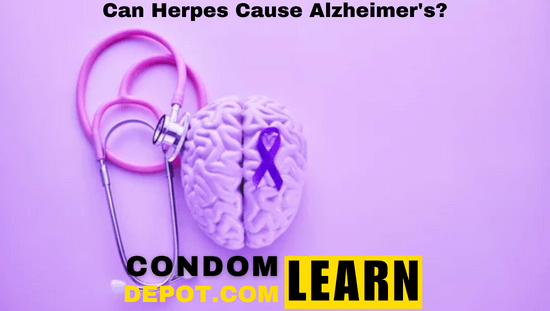Learn

Can Herpes Cause Alzheimers?
Can the herpes simplex virus REALLY cause Alzheimers disease?
Wait. A contagious clump of oral cold sores can, in the long run, lead to the most common form of dementia? According a recently released scientific studies conducted on HSV-1 during the last five years, yes, it can. And here I thought the kiss of death was just an urban legend.
As covered in, "Herpes Simplex Virus," HSV-1 and HSV-2 are two different strains of the herpes virus. HSV-1 is generally located on the skin surrounding the mouth and HSV-2 is usually located around the genital and/or anal region.
Neither require the swapping of fluids to transfer from one partner to the next, as herpes is a skin-to-skin transmittable virus. Condoms (especially female condoms) greatly reduce the risk of transmission of HSV during sex acts, as do dental dams, but something as simple as sharing a drink or giving someone a peck on the lips is sometimes all it takes to contract HSV-1.
All strains of herpes are lifelong and have no cure (much like HPV), but outbreaks and high risk of transmission cases can be managed and treated. The severity and frequency of outbreaks can diminish with prescription antivirals and over-the-counter creams like Abreva can provide some relief from symptoms.
When thinking about herpes, it's important to realize that the entire human body is connected, working as a symbiotic unit of systems and if too many things go awry, at least one organ will suffer, in this case the brain. In the medical field this is called the infection burden. One of the challenges of Western medicine in is helping people to realize the whole body works together for optimal health.
In fact, any extra viral contributions to the system can result in long term damage to inner organs, even the brain. Another member of the sexually transmitted herpes virus family, cytomegalovirus (or CMV) was also found to add to the negative effects on the brain during aging, but to a much lesser degree than HSV-1.
Some scientists believe that herpes is to blame for a viral overload of the brain, resulting in lack of cognitive function and in tissue degeneration, while others remain more skeptical. The idea for the study between herpes and Alzheimer's was proposed in 1982, but it wasn't underway until 2009.
In 2014, strong scientific evidence linking the presence of HSV-1 (the virus which causes oral herpes, a.k.a. cold sores) to the development of Alzheimer's disease later on in life was released to the public. After multiple studies by multiple scientists, the official results indicate that having the HSV-1 in your system literally doubles your chances of developing Alzheimer's later in life and that 50% of Alzheimer's patients developed the disease as a direct result of having HSV-1.
So is the very widespread prevalence of HSV-1 the real reason that Alzheimer’s disease is so common in today’s society, accounting for the sixth highest cause of death in America last year? Most likely.
According to the latest data gathered by the Center for Disease Control (CDC), approximately one out of every six people in America have HSV-1 and most carriers do not show any signs or symptoms (a.k.a. are asymptomatic), such as the telltale patches of blisters seen around the mouth.
While the sexually transmitted virus known as herpes is not the first culprit to be blamed for this often deadly medical epidemic which impairs the normal functionality of the human brain to such a large degree, Alzheimer’s mysterious and wily origin has been a topic of hot scientific debate for as long as I can remember.
First, I remember inherited genes being named the definitive cause, then it was lifestyle choices such as using products with aluminum, artificial sweeteners, etc. But, an STD or STI? Hmm, nope. Don't remember discussing that possibility with any of my grandparents' doctors. And there were a lot of them, as all four of my eldest relatives slowly passed away before my eyes from this awful, heartbreaking and degenerative brain disease.
Dementia, forgetfulness and confusion-- anyone who has seen a loved one slip under the silent sheet of Alzheimer’s disease knows how incredibly brutal this medical condition is on the mind and body. Inability to care for one's self or for others anymore is devastating to watch, requires expensive institutional or at-home care and most people have a very tough time dealing with the loss of short-term memory, and the resulting fear surrounding this reduced capacity to remember.
But I hate to leave on a depressing note, so here is a gratuitous gif highlighting the more humorous side of dealing with this form of dementia as well as some very good news from the scientific development community: a herpes vaccine is in the works.
Luckily for those coming up in the next generation or two, herpes may be an ancient thing of the past like the Bubonic Plague is to us now. "Hooray! Herpes Vaccines are Underway!" delves into the scientific strides being taken to develop a safe vaccine against the herpes virus, which will not only prevent the catching on herpes, but will reduce the symptoms and likelihood of transfer in those who are already infected with the virus.
Could the upcoming herpes vaccine be the answer to this increasingly serious Alzheimer's problem in our American elders? We'll just have to wait and see, but I sure do hope so.












